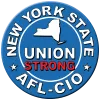Adopt Pro-Worker Artificial Intelligence (AI) and Technology Policies

The proliferation and use of artificial intelligence (AI) in countless applications and the exponential pace at which it is developing has led to very serious labor concerns that will affect our jobs, economic lives, and privacy. AI can be a valuable tool and it's responsible development and use will be essential moving forward, however it should not be viewed as a replacement for jobs or human decision making. Strong transparency and disclosures on its uses and applications, as well as worker protections, must be enacted to ensure that AI has a positive impact on our economy, not a negative one. We also need to make sure government agencies are setting the tone for responsible use of AI in their own operations to protect workers and people who access government services.
Policy Positions
Support the BOT Act
- Restricts workplace electronic monitoring tools that gather employee data.
- Requires employers to give written notice to employees about the use of electronic monitoring and allow employee access to the data that is collected.
- Includes language to prevent bias, discrimination, and exploitation in the workplace.
- Regulates AI tools that evaluate work and make decisions regarding hiring, promotion, and other labor relations issues.
- Requires human oversight of the operations and output of AI systems.
AI and Autonomous Vehicles
- Oppose proposals that expand and allow the use of autonomous vehicles.
- Oppose eliminating the law that requires a live operator in control of motor vehicles.
Regulate Dynamic and Algorithmic Wage, Benefit, and Settlement Determinations and Prevent Price Gouging
- Prohibit the use of algorithms from determining wages, salaries, and benefits that vary based on individual applicant characteristics.
- Protect consumers from discriminatory pricing and preserve jobs in grocery and drug stores.
New York Workforce Stabilization Act
- Establishes AI systems impact assessments on jobs and notification requirements similar to the WARN Act.
- Requires employers with 100 or more employees using AI to submit job impact assessments to the Department of Labor (DOL).
- Imposes a 2% corporate income tax on companies that use AI to displace 15 or more employees, with revenue funding workforce development and retraining.
